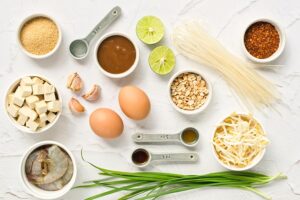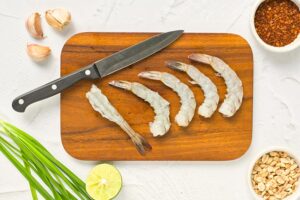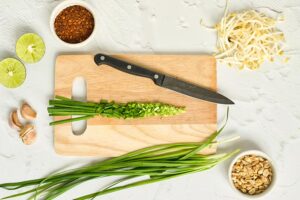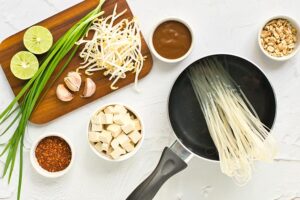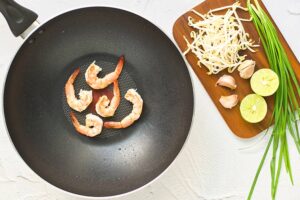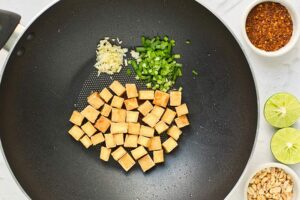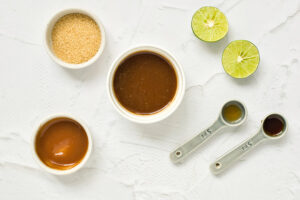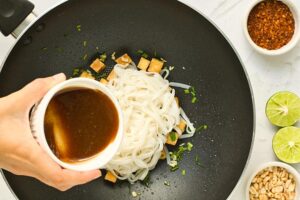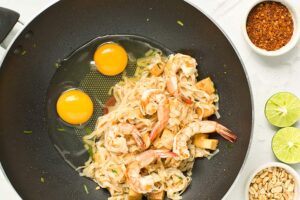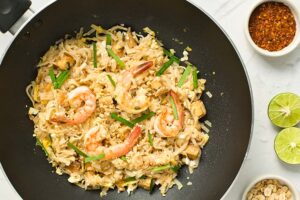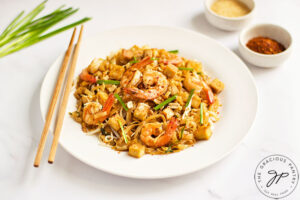Healthy Shrimp Pad Thai Recipe
This post may contain affiliate links. If you make a purchase through links on this site, I may earn a commission.
Read my Privacy Policy.
Love takeout pad thai? This homemade, healthy shrimp pad thai should definitely be on your dinner list this week!
A spicy aromatic blend of flavors is all that stands between you and an amazing dish of Shrimp Pad Thai. Forget the fast food-like expensive stuff you can get in some thai restaurants. Make it at home cheaper and healthier!
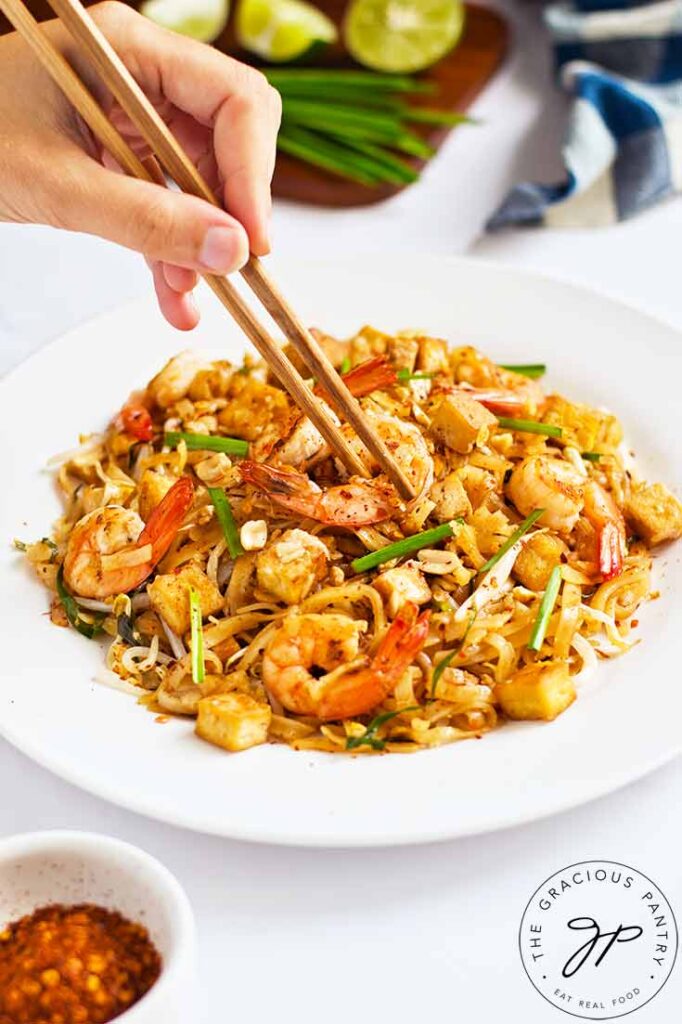
What Is Shrimp Pad Thai?
Shrimp Pad Thai is a delicious Thai noodle dish made stir-fry-style. It has a sweet and sour sauce and typically has peanuts mixed in (although you can skip those if you wish). It has vegetables, eggs, tofu (optional), and fettuccini-style rice noodles. The protein can be many things such as chicken, beef, pork, or in this case… shrimp!
What Makes This Dish Healthy?
You aren’t using sugar-ladened ingredients or any MSG. This dish calls for brown rice noodles instead of white (easily found at either a health food store such as Whole Foods in the ethnic aisle or on Amazon. See link below)
What Sweetener To Use
Most Pad Thai is made with brown sugar and plenty of it. This recipe calls for coconut sugar in smaller amounts. But it will still be plenty sweet! You can also use other unprocessed, granular sweeteners such as Sucanat or monk fruit.
What Noodles To Use
Look for flat, brown rice noodles at Whole Foods or other stores with an ethnic aisle. There are pad thai noodles that are made with brown rice. Whole Foods carries them.
What Shrimp To Use
Use either colossal shrimp or prawns for this. The recipe uses raw shrimp, but you can use pre-cooked and frozen shrimp as well if you thaw them first. You just won’t cook the shrimp as long if they are pre-cooked.
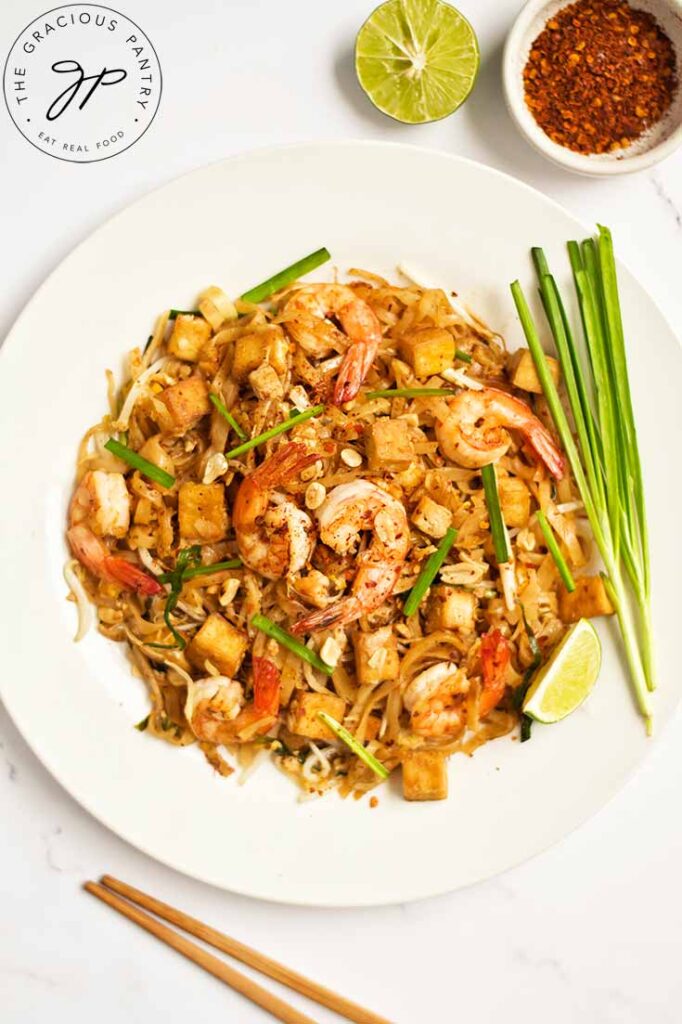
How To Thaw Frozen Shrimp
If you are using frozen shrimp, place the entire package in a bowl and set it in the fridge for about 24 hours. Then open the package and rinse the shrimp.
Do I Have To Use Fish Sauce?
You don’t have to, but you will lose a lot of flavor here. If you prefer to not use smelly fish sauce (or if you are plant-based and plan to make this without any animal products) you can make this vegan fish sauce here. It’s not as smelling as regular fish sauce and has all-natural ingredients.
How Many Calories Are In Healthy Shrimp Pad Thai?
That depends on your recipe and how many servings you divide it into. For this recipe, I divided it into three servings and ended up with 671 calories per serving. A good amount for a healthy dinner.
Which Protein Is Best With Pad Thai?
Any protein will do. If you prefer not to use shrimp, you can try chicken, beef, or pork too. Or you can leave out the meat altogether to make this a plant-based meal.
How To Make This Healthy Pad Thai Low Carb
Use low-carb noodles, coconut aminos (instead of soy sauce) and low-carb sweetener.
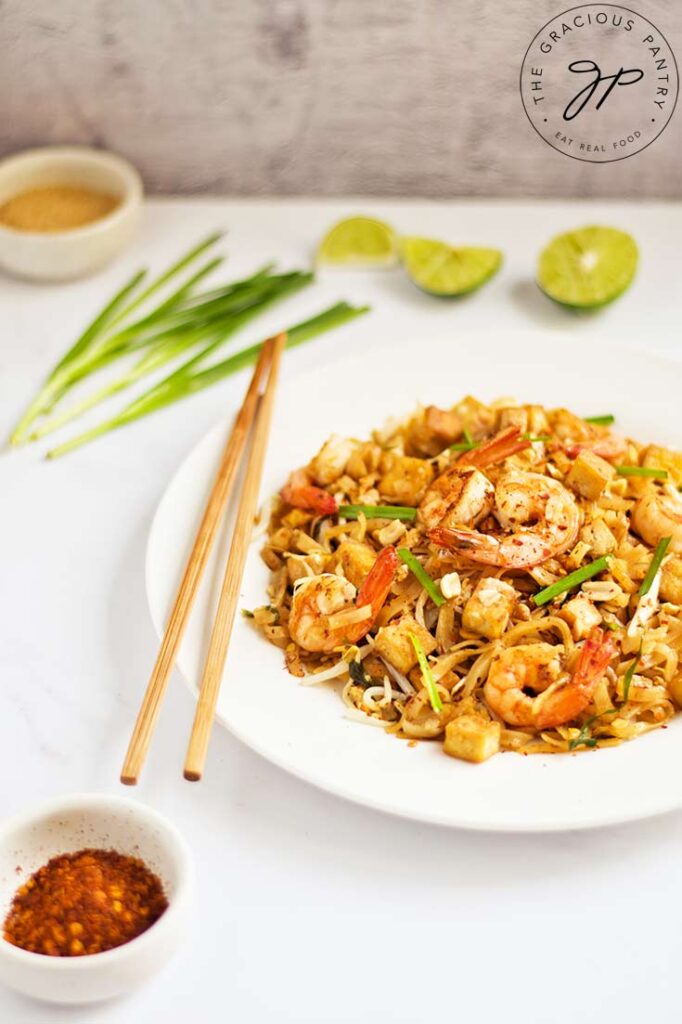
Recipe Additions
If you wish, you can also add these to your pad thai:
- shredded carrots
- fresh cilantro – for garnish
- cabbage – green cabbage works best. Slice it very thin so it cooks quickly.
About The Ingredients
Brown rice pad thai noodles – see notes above.
Large shrimp – You can also use prawns if you prefer them.
Large garlic cloves
Large eggs
Firm tofu – Optional.
Coconut oil – You can also use sesame oil if you prefer the flavor.
Bean sprouts
Chives – Garlic chives are best if you can find them. Use half to cook with and half for fresh garnish. You can also use green onions or scallions if you prefer them.
Fresh lime – You can use as much as you like. 1 wedge per person is what you’ll need. This is a garnish you use at serving.
Peanuts – Salted or unsalted, as you like.
Ground chilies – Or chili pepper flakes.
Pad Thai Sauce Ingredients
Fish sauce – see notes above.
Soy sauce – or coconut aminos if you are soy-free.
Tamarind paste – This is found in the ethnic aisle at the grocery store, in ethnic grocery stores, or on Amazon. (See link below)
Coconut sugar – or Sucanat or other unprocessed sweetener.
How To Make Healthy Shrimp Pad Thai
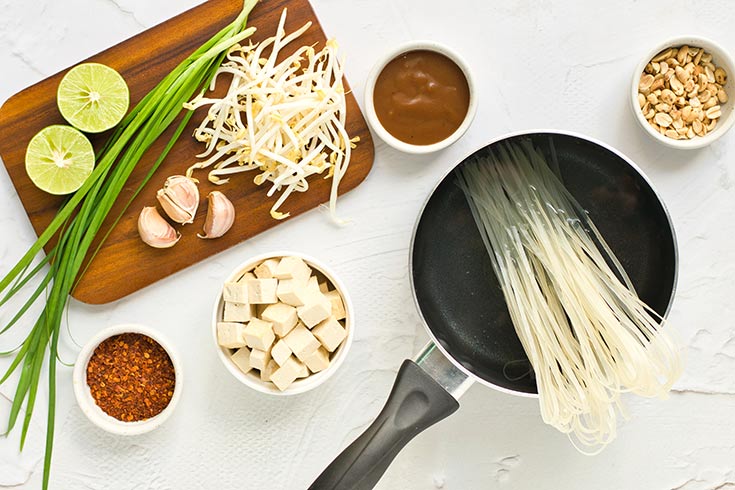
Prep and measure all your ingredients so you have everything ready to go.
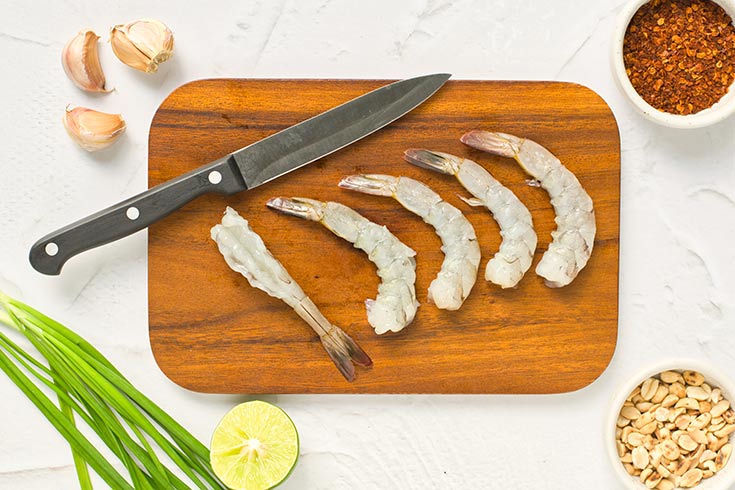
First, remove the shrimp heads, skin, and legs. Wash them and set them to dry on a paper towel.
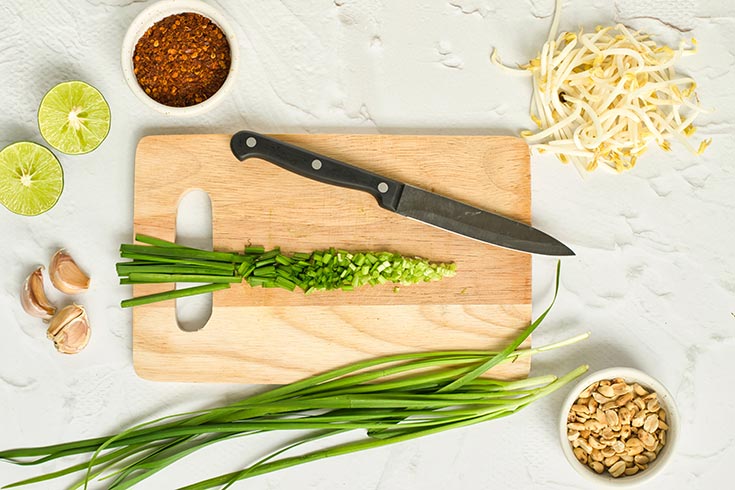
Slice the chives into small pieces, then peel and coarsely chop the garlic.

The Noodles
Cook the noodles to package directions, then strain them. (Move fast after this because they stick together if they sit for longer than 4-5 minutes.)
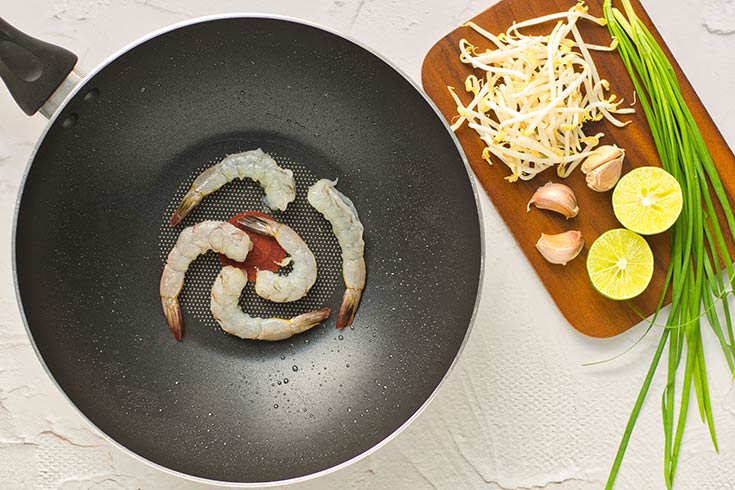
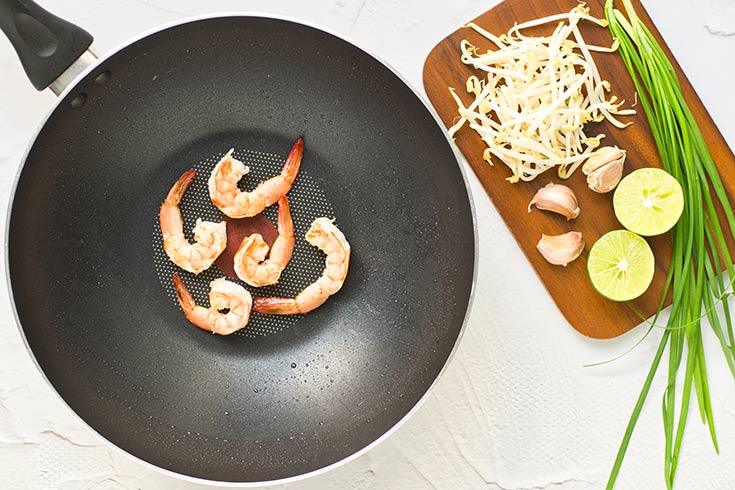
While the noodles cook, cook the shrimp in the coconut oil on high heat until the shrimp are fully cooked. Set them aside.

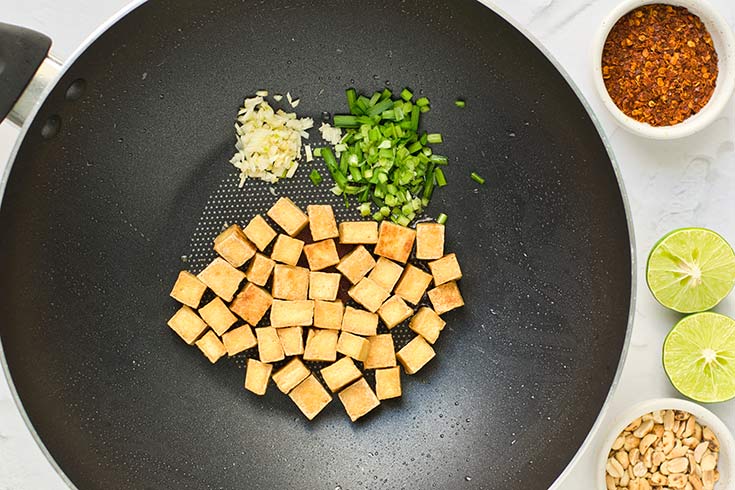
If you are using tofu, add it to the wok and cook until it turns golden brown on every side. Once the tofu is ready, add the garlic, and the chopped garlic chives and toss around for 20-30 seconds. Set aside.
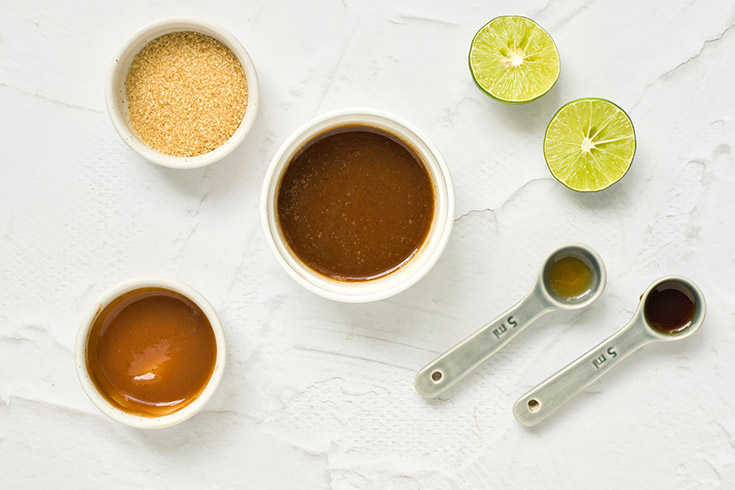
The Sauce
In a small mixing bowl, whisk together the tamarind purée, fish sauce, sweetener, and soy sauce; mix until the sweetener fully dissolves, then set it aside.
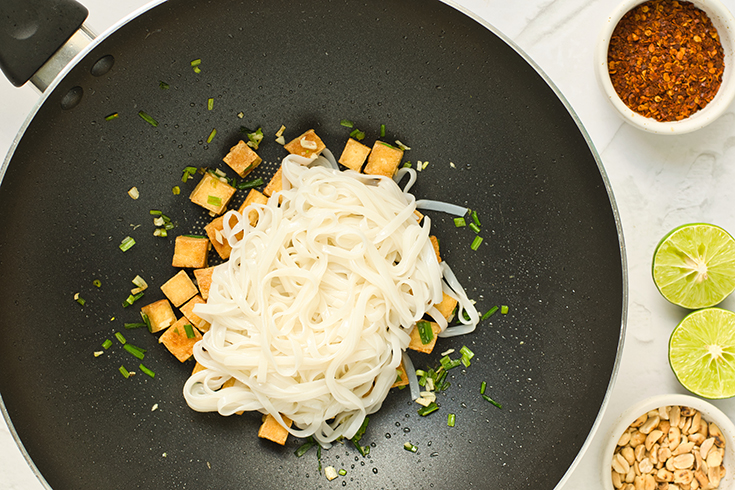
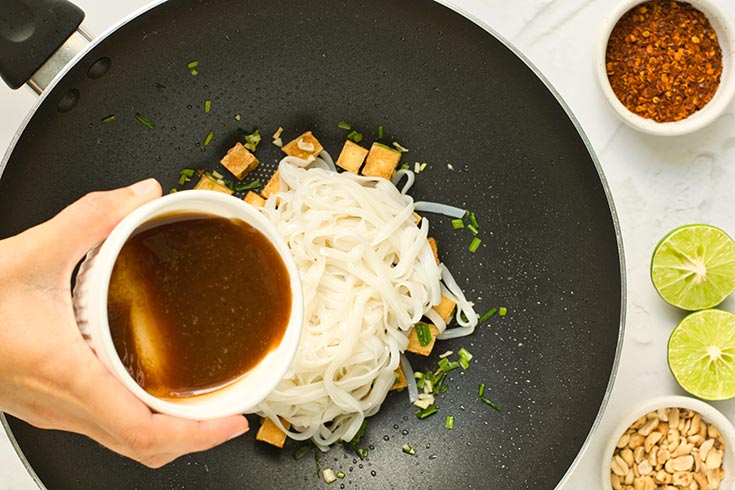
Add the noodles to the wok with the sauce and mix around until the noodles change color to light brown.
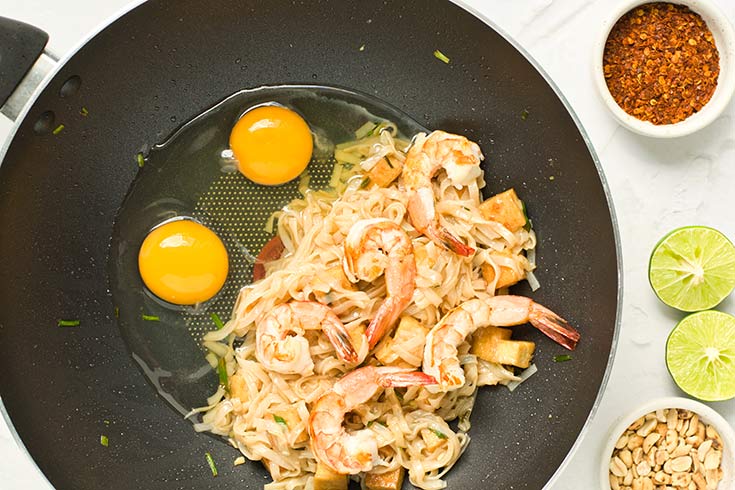
Push the noodles to one side of the wok, and pour the eggs in on the other side.
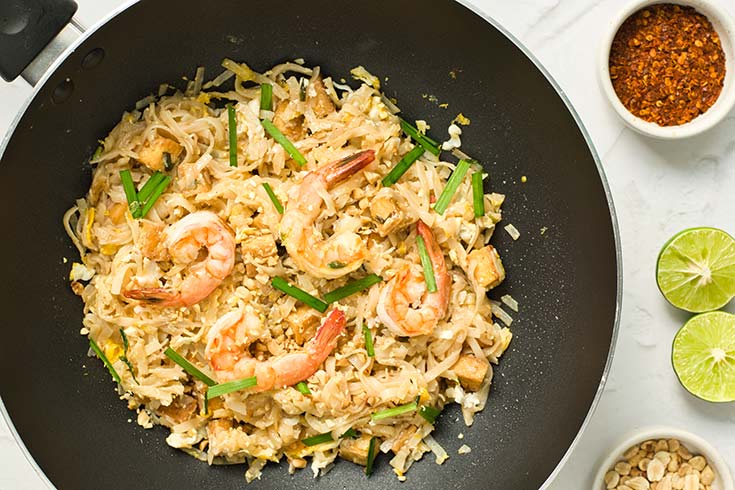
Then scramble using a wooden spoon or chopped stick. At the end add the shrimp bean sprouts, more fresh garlic chives and the peanuts, continue tossing all the ingredients until combined.
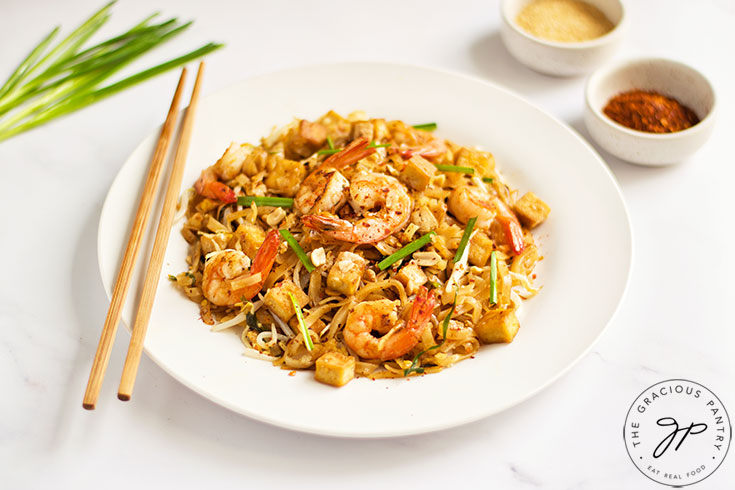
Serve immediately sprinkled with remaining peanuts and lime wedges on the side, a sprinkle of chili, and a handful of extra chives.
How To Store Shrimp Pad Thai
It’s best to eat this right away. This will dry out in the fridge. So if you know you’re going to have leftovers, I recommend doubling up on the sauce so you can mix more in. That aside, store this in an airtight container in the fridge for up to three days.
How To Reheat Shrimp Pad Thai
Reheat this in a wok or in the microwave. (The wok works best). Toss it with a bit more sauce to freshen it up and avoid dryness.
Can You Freeze It?
Nope! Not a good idea!
What Is Pad Thai Usually Served With?
Typically, Pad Thai is served alone, for the most part. If you really want to serve a side dish with this, consider a small bowl of soup or a fresh cucumber salad.
Recipe Supplies
For this recipe, you’ll want a wok (or large nonstick skillet), a small mixing bowl and a pot for cooking the noodles. If you need any of these items, simply click an image here to be taken to that product on Amazon. (Affiliate link)
More Healthy Thai-Inspired Recipes
SUBSCRIBE
Remember to subscribe to my free newsletter to receive all my latest recipes in your inbox. Click here to sign up!
Healthy Shrimp Pad Thai Recipe Card

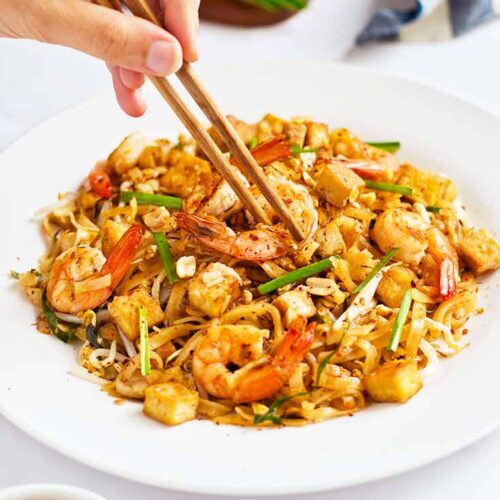
Shrimp Pad Thai Recipe
Equipment
- 1 Wok (or large skillet)
- 1 small bowl
- 1 Pot
Ingredients
- 8 oz. brown rice noodles (see notes above)
- 15 large shrimp
- 2 large garlic cloves
- 2 large eggs
- ½ cup cubed firm tofu (optional)
- 2 tbsp. coconut oil
- 1½ cup bean sprouts
- ¼ cup chives (garlic chives are best if you can find them. Use half to cook with and half for fresh garnish)
- 2 wedges fresh lime
- ¼ cup peanuts (salted or unsalted, as you like)
- 2 tsp. ground chilies (or chili flakes)
Sauce Ingredients
- 3 tbsp. fish sauce (see notes above)
- 2 tbsp. soy sauce (or coconut aminos if you are soy-free)
- 4 tbsp. tamarind pureé
- 3 tbsp. coconut sugar (or Sucanat or other unprocessed sweetener)
Instructions
- Prep and measure all your ingredients so you have everything ready to go.

- First, remove the shrimp heads, skin, and legs. Wash them and set them to dry on a paper towel.

- Slice the chives into small pieces, then peel and coarsely chop the garlic.

The Noodles
- Cook the noodles to package directions, then strain them. (Move fast after this because they stick together if they sit for longer than 4-5 minutes.)

- While the noodles cook, cook the shrimp in the coconut oil on high heat until the shrimp are fully cooked. Set them aside.

- If you are using tofu, add it to the wok and cook until it turns golden brown on every side. Once the tofu is ready, add the garlic, and the chopped garlic chives and toss around for 20-30 seconds. Set aside.

The Sauce
- In a small mixing bowl, whisk together the tamarind purée, fish sauce, sweetener, and soy sauce; mix until the sweetener fully dissolves, then set it aside.

- Add the noodles to the wok with the sauce and mix around until the noodles change color to light brown.

- Push the noodles to one side of the wok, and pour the eggs in on the other side.

- Then scramble using a wooden spoon or chopped stick. At the end add the shrimp bean sprouts, more fresh garlic chives and the peanuts, continue tossing all the ingredients until combined.

- Serve immediately sprinkled with remaining peanuts and lime wedges on the side, a sprinkle of chili, and a handful of extra chives.





